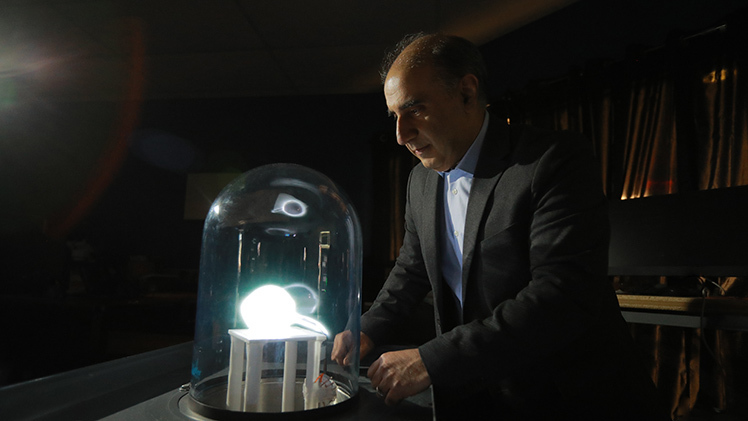As technology has trended wireless, the electromagnetic spectrum on which devices communicate information and instructions has grown increasingly congested.
“Because of that, we have to use our spectrum much more efficiently,” said Dr. Abbas Semnani, an associate professor in the Department of Electrical Engineering and Computer Science.

Dr. Abbas Semnani, an associate professor in the Department of Electrical Engineering and Computer Science, examines a plasma-surrounded antenna. His latest research, supported by an NSF CAREER Award, explores microplasmas for more powerful and broadly tunable microwave electronics.
In new research supported by a five-year, $555,796 award through the National Science Foundation’s Faculty Early Career Development (CAREER) Program, Semnani will explore a novel way to achieve this efficiency. He will look to cold plasma to realize reconfigurable radio-frequency electronics more powerfully and more widely tunable than with conventional technologies like semiconductors.
Semnani is one of two faculty members at The University of Toledo to receive a 2024 CAREER Award, which is among the most prestigious under the National Science Foundation. CAREER Awards support early-career faculty who have the potential to serve as academic role models in research and education and to lead advances in the mission of their department or organization. Dr. Kennedy Doro, an assistant professor in the Department of Environmental Sciences, also received a CAREER Award.
“I’m thrilled and honored to receive this CAREER Award,” Semnani said, who joined the faculty at UToledo in 2019. “Every research grant is important to the advancement of new technologies and to the researchers who spend significant time developing them. But this is a very special one, recognizing my research and educational career path.”
Semnani’s background is in electrical engineering, in which he holds a bachelor’s degree from the University of Tehran in Iran and master’s and doctoral degrees from the K.N. Toosi University of Technology in Iran. His interest in the electromagnetic properties of plasma – an ionized gas that is the fourth state of matter – grew out of his post-doctoral research at Purdue University beginning in 2012.
Plasmas have emerged as an area of substantial research interest of late, with wide-ranging applications including medicine, food preservation, water treatment, electric propulsion and semiconductor fabrication. Semnani is interested in the potential of microplasmas as a powerful tool for radio-frequency tuning, a necessary function in multi-objective and multifrequency systems that allow for more efficient use of the electromagnetic spectrum.
Think of a cellphone as an example of such multi-objective and multifrequency systems, he suggested. It’s a single device with multiple objectives — voice calls, navigation, internet, etc. — that each operate on a different frequency. Tuning technology is what allows these reconfigurable devices, as they’re known, to be tuned at the appropriate frequency band.
“Conventional tuning mechanisms, like semiconductor devices, microelectromechanical systems, liquid crystals and ferromagnetic materials, are constrained by limited tuning ranges and low power handling capabilities,” Semnani said. “Plasma has two important advantages in comparison: It is capable of handling much higher powers and it provides a range of electromagnetic properties that is inaccessible with other technologies.”
In his research supported by his CAREER Award, Semnani will explore a closed-loop sensing and control system to precisely manipulate the electron density of microplasmas to control their unique electromagnetic properties to be used in reconfigurable devices along a wide range of frequencies.
“What we are exploring here is a fundamental science, so there will be countless applications,” Semnani said. “If we can control the electromagnetic properties of plasmas, then we will be able to apply this technology to essentially any wireless system. They’re all based on tunability, on reconfigurability.”
CAREER Awards support both research and education, and Semnani plans to introduce students to his work and to the applications of plasma more broadly. His award allows for two graduate and two undergraduate students to work with him in each year of the five-year award period, as well as regular engagement with students as young as eighth grade through the Toledo Excel program.
The award also allows for the establishment of an educational plasma lab at UToledo.
“Plasma is an area of intense research interest,” Semnani said. “This educational lab will be a valuable resource for students interested in learning not only about my work on the electromagnetic properties of plasma, but about its applications in various fields.”